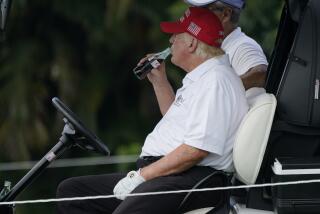Drug Czar Tells Kids to Respect Self, Reject Abuse
- Share via
NORTH HOLLYWOOD — Barry McCaffrey, the Clinton administration’s new drug czar, reemphasized the importance of prevention on Thursday during commencement exercises for an anti-drug program at Fair Avenue Elementary School.
In his second day in California to promote the president’s revamped war on drugs, the retired Army general encouraged more than 60 students graduating from a DARE drug-education program at the school to believe in themselves when tempted by narcotics or alcohol. He also urged their parents to serve as role models to dissuade the fifth- and sixth-graders from abusing those substances.
“Your participation in this program after 17 weeks is a wonderful statement about yourselves,” McCaffrey told the students. “When you look at the people you admire . . . most of us understand that abusing drugs destroys your life. It isn’t enough to have the DARE program alone. The parents are the ones who count.”
Students, meanwhile, said they were impressed by McCaffrey.
“It felt good to me for him to come to our school and give us this time, because it made me think that we really did something good,” said 12-year-old Esmeralda Argueta, who presented McCaffrey with a school sweatshirt and framed poster of the school’s latest crop of DARE graduates.
Drug Abuse Resistance Education is a national anti-drug and violence program originated in city schools by the Los Angeles Police Department and still taught by officers. It is in its 13th year and boasts a total of 33 million children worldwide and 25 million kids in the U.S. who have participated.
A top priority of Clinton’s retooled war on drugs, unveiled in April, is encouraging young people to reject drugs.
On Wednesday, McCaffrey spoke at the City Club of San Diego to sound what promises to be a theme for the upcoming political season: that eradicating drugs will require both tough law enforcement and increased treatment programs. He said about 9% of the drug war budget is used on interdiction and 20% on drug treatment.
McCaffrey also told his San Diego audience the Clinton administration is still opposed to using federal money for needle-exchange programs, a controversial approach used in 55 cities in the United States to combat the spread of AIDS, hepatitis and other diseases spread by the sharing of dirty needles.
“I’m still a little skeptical of needle exchange being anything but a temporary approach,” he said.
Still, McCaffrey said the administration is not opposed to local and state governments spending their own funds on needle exchange. Under a 1992 law passed by Congress, federal money can be used for needle-exchange programs only if it can be shown that such programs reduce the spread of HIV and do not encourage drug use.
A panel of the National Academy of Sciences concluded last fall that both criteria had been met in programs that exchange 8 million needles annually. The acting surgeon general could thus allow the use of federal funds, but so far has not done so.
McCaffrey was named as director of the White House Office of National Drug Policy in January and began his duties in March.
More to Read
Sign up for Essential California
The most important California stories and recommendations in your inbox every morning.
You may occasionally receive promotional content from the Los Angeles Times.











